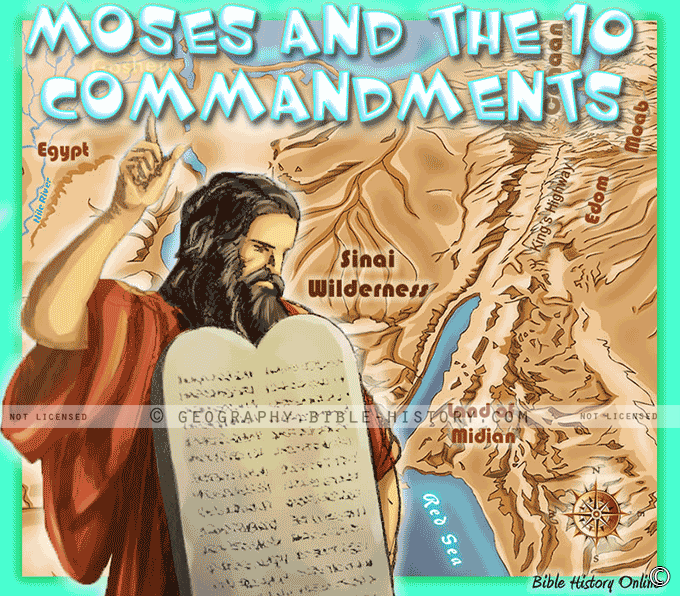
The story of Moses and the Ten Commandments is one of the most pivotal narratives in the Judeo-Christian tradition, a tale that echoes through the corridors of time as a foundational covenant between humanity and the divine. Set against the backdrop of the Sinai wilderness, this story unveils the journey of a prophet, a people's liberation, and a set of moral principles that have shaped ethical thought and spiritual practice for millennia.
The Call of a Prophet
Moses, chosen by God, embarked on a mission to free the Israelites from their enslavement in Egypt. His journey of leadership was not only a physical liberation but also a spiritual calling, culminating in the divine encounter at Mount Sinai.
Revelation at Mount Sinai
The pinnacle of this story unfolds as Moses ascends Mount Sinai and receives the Ten Commandments—an embodiment of God's moral and ethical guidance. This divine revelation marked the establishment of a covenant, a sacred agreement between God and the Israelites that would guide their conduct and relationship.
Moral Principles for Humanity
The Ten Commandments encompass a set of principles that transcend time and culture. From the acknowledgment of God's supreme authority to ethical imperatives regarding respect for life, honesty, and respect for others' possessions, these commandments lay the groundwork for a just and harmonious society.
A Guide for Spiritual Living
Beyond their legal and ethical significance, the Ten Commandments also hold deep spiritual insights. They reflect humanity's need for both divine guidance and personal introspection. They serve as a roadmap for living a life of integrity, compassion, and reverence for the divine.
A Lesson in Covenant
The story of Moses and the Ten Commandments is a lesson in covenant—God's promise to guide and protect his people, and humanity's promise to follow his guidance. It's a testament to the interplay between human responsibility and divine grace, a balance that resonates with the core of faith traditions.
Continuing Relevance
The Ten Commandments continue to shape moral and ethical discussions, transcending religious boundaries. Their enduring relevance is a testament to their universality and the wisdom they impart. They challenge individuals and societies to cultivate virtues that foster justice, respect, and mutual understanding.
The story of Moses and the Ten Commandments is a tapestry of liberation, divine revelation, and moral instruction. It encapsulates a journey of faith, leadership, and the establishment of a covenant that remains a guiding light for humanity's quest for meaning and ethical living. As we reflect on this story, we find not only historical significance but a profound call to uphold principles that contribute to the betterment of ourselves and the world around us.
Blank Topo Map of The World
Abraham’s Journey
The Captivity of Judah (586-516 B.C.)
The Fall of Judah 586 B.C.
The Northern Kingdom of Israel
The Southern Kingdom of Judah
The Divided Kingdom
The Fertile Crescent
Ur of the Chaldees
Shechem in Old Testament Times
Prophets, Kings, and Nations
Jesus Last Passover
New Testament Israel
New Testament Places
Old Testament Israel
Provinces of the Roman Empire
Israel during David’s Kingdom
David’s Kingdom
Cities of the New Testament 4
Cities of the New Testament 3
Cities of the New Testament 2
Mediterranean Sea
Cities of the New Testament
First Century Jerusalem
Empire of David and Solomon
David’s Kingdom
Israel Under Rehoboam
Ophir and Tarshish
The Period of the Kings
Ramoth Gilead
Samaria
Solomon’s Temple
Zarephath and MT Carmel
Jabesh Gilead and Tribes
Judah in the Time of David
Kingdom of Saul
Kirjath Jearim
Michmash
Mount Gilboa in the Time of David
Nob Davids Flight
Shiloh
Israel and Judah
Assyrian Empire Under Esarhaddon
Assyrian Empire Under Sennacherib
Captivity of 10 Tribes
Events in 2 Kings
The Khabur River
Israel and Syria
Captives From Judah
Kingdom of Jeroboam
Mesha’s Kingdom
Pharaoh Necho Battles King Josiah at Megiddo
Babylonian, Mede and Persian Empires
Samaria and Nearby Territories
Syria at its Height
Hebron
Mahanaim
1949 Map of Israel With Boundaries
First & Second Journeys of Paul
Journeys of the Apostles
Paul’s Third Missionary Journey
Saul’s Journey to Damascus and Arabia
Paul’s Final Visits
Paul’s 1st Missionary Journey
Paul’s 2nd Missionary Journey
Paul’s 3rd Missionary Journey
Paul’s Voyage to Rome
Phillip Journeys to Samaria and Gaza
Judah at the Time of Amos
Empire of Alexander the Great
Israel Under the Maccabees
Galilee During Maccabees
Idumea Intertestamental Period
Kingdom of the Ptolemies
Kingdom of the Seleucids
Ptolemaic Egypt Seleucid Asia
The Roman World
Kingdom of Ptolemies and Seleucids
The World During the 6TH Century BC
Mount Horeb
The Red Sea
The Exodus
Ezra’s Journey to Restore Jerusalem
Israel and Judah During Hosea’s Time
The Ancient World
Canaan During the Time of Abraham
The City of Shechem
Supposed Location of the Garden of Eden
The Land of Israel in Genesis
The Jordan River
The Kingdom of Nimrod
Mount Ararat and Mesopotamia
The Descendants
Sodom and Gomorrah
The Kingdom of Egypt
The Hamites
The Kingdom of the Hittites
Ur of the Chaldees
Judah at the Time of Haggai
Jesus Passes Through Samaria
